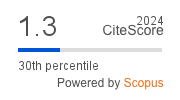The relation of periodontal diseases to systemic diseases
Vol. 41 No. 4 (2008): December 2008
Articles
December 1, 2008
Downloads
Djamil, M. S., & Roeslan, B. O. (2008). The relation of periodontal diseases to systemic diseases. Dental Journal (Majalah Kedokteran Gigi), 41(4), 167–172. https://doi.org/10.20473/j.djmkg.v41.i4.p167-172
Downloads
Download data is not yet available.
- Every manuscript submitted to must observe the policy and terms set by the Dental Journal (Majalah Kedokteran Gigi).
- Publication rights to manuscript content published by the Dental Journal (Majalah Kedokteran Gigi) is owned by the journal with the consent and approval of the author(s) concerned.
- Full texts of electronically published manuscripts can be accessed free of charge and used according to the license shown below.
- The Dental Journal (Majalah Kedokteran Gigi) is licensed under a Creative Commons Attribution-ShareAlike 4.0 International License

















